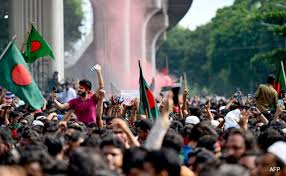
Table of Contents
The Turmoil in Bangladesh and Its Implications for India
Introduction
Bangladesh has been experiencing significant political and social turmoil, marked by a series of crises that have captured global attention. From allegations of electoral malpractices to political violence and economic challenges, the situation in Bangladesh has not only impacted its own citizens but also has far-reaching implications for its neighboring country, India. This article explores the current turmoil in Bangladesh, its causes, and the broader implications for India.
Overview of the Situation in Bangladesh
Political Instability
Bangladesh has long been plagued by political instability, with power struggles between the ruling Awami League (AL) and the opposition Bangladesh Nationalist Party (BNP). The 2018 general elections were marred by allegations of fraud, voter intimidation, and suppression of opposition voices. The Awami League’s victory, led by Prime Minister Sheikh Hasina, was disputed, leading to widespread protests and unrest.
Recent Developments
The situation escalated further with recent developments:
- Military Involvement: In July 2024, the Bangladesh Army announced the formation of a new government led by Nobel Laureate Muhammad Yunus, a move that has generated both domestic and international reactions.
- Human Rights Concerns: There have been growing concerns about human rights abuses, including arbitrary arrests, suppression of dissent, and restrictions on press freedom.
- Economic Challenges: Bangladesh faces economic difficulties, including high inflation, unemployment, and a struggling healthcare system exacerbated by the COVID-19 pandemic.
- turmoil
Causes of the Turmoil
Electoral Malpractices
The 2018 elections were a flashpoint, with accusations of vote rigging, biased electoral practices, and disenfranchisement of opposition voters. The lack of transparency in the electoral process has fueled political dissent and unrest.
Political Repression
The Awami League’s dominance has been marked by increased political repression. Opposition leaders and activists have faced harassment, imprisonment, and violence. The government’s heavy-handed approach has stifled dissent and led to widespread disillusionment among the populace.
Economic Struggles
Bangladesh’s economic woes, including inflation and unemployment, have compounded the political crisis. The COVID-19 pandemic has further strained the economy, affecting businesses, employment, and public services. Economic hardship has exacerbated public frustration and instability.
Human Rights Violations
Reports of human rights violations, including extrajudicial killings, arbitrary arrests, and restrictions on freedom of expression, have drawn criticism from international organizations and have contributed to the unrest.
Implications for India
Political and Diplomatic Impact
- Bilateral Relations: India shares a long border with Bangladesh and has a history of diplomatic engagement. The instability in Bangladesh could strain bilateral relations, particularly if there are accusations of Indian interference or if the situation leads to cross-border tensions.
- Security Concerns: The unrest in Bangladesh has the potential to spill over into India, especially in the bordering states of West Bengal, Assam, and Tripura. This could lead to security challenges, including increased migration and the potential for cross-border violence.
Economic Impact
The economic turmoil in Bangladesh affects India in several ways:
- Trade Relations: Bangladesh is an important trade partner for India, with significant bilateral trade in goods and services. Economic instability in Bangladesh could disrupt trade flows and affect Indian businesses operating in the region.
- Investment Risks: Indian businesses and investors with interests in Bangladesh may face increased risks due to the volatile political and economic environment. This could impact investment decisions and economic cooperation between the two countries.
Humanitarian Concerns
The humanitarian impact of the turmoil in Bangladesh has implications for India:
- Refugee Crisis: Political violence and economic hardship in Bangladesh could lead to an influx of refugees into India. This would place additional strain on India’s resources and infrastructure, particularly in states bordering Bangladesh.
- Humanitarian Aid: India may need to engage in humanitarian assistance and provide support to address the crisis in Bangladesh. This could include offering aid to displaced individuals and supporting international efforts to stabilize the situation.
Regional Stability
- China’s Influence: The instability in Bangladesh could provide an opportunity for increased Chinese influence in the region. China has been expanding its presence in South Asia through investments and diplomatic engagement. India will need to navigate the implications of this increased influence and its potential impact on regional dynamics.
Response from India
Diplomatic Engagement
India has been closely monitoring the situation in Bangladesh and has engaged in diplomatic efforts to address the crisis. India has called for dialogue and peaceful resolution of the political issues and has expressed concern about human rights violations. Diplomatic channels between the two countries remain crucial in managing the situation and maintaining stability.
Security Measures
In response to potential security challenges, India has strengthened its border security and increased surveillance along the border with Bangladesh. This is to prevent any spillover of violence and to manage the potential influx of refugees. Coordination with security agencies and local authorities in border states is essential for maintaining peace and order.
Economic and Humanitarian Support
India may explore options for providing economic and humanitarian support to Bangladesh. This could involve engaging with international organizations and offering assistance to address the economic and humanitarian needs arising from the crisis. Collaborative efforts with other countries and organizations can help stabilize the situation and support the affected population.
Conclusion
The turmoil in Bangladesh has far-reaching implications for India, affecting political, economic, and humanitarian aspects. The situation requires careful management and proactive engagement from both countries to address the challenges and maintain stability in the region. India’s response, including diplomatic efforts, security measures, and support initiatives, will play a crucial role in navigating the complexities of the crisis and ensuring regional peace and cooperation.
As Bangladesh continues to grapple with its internal challenges, the international community, including India, must work together to support a peaceful resolution and promote stability in South Asia.









